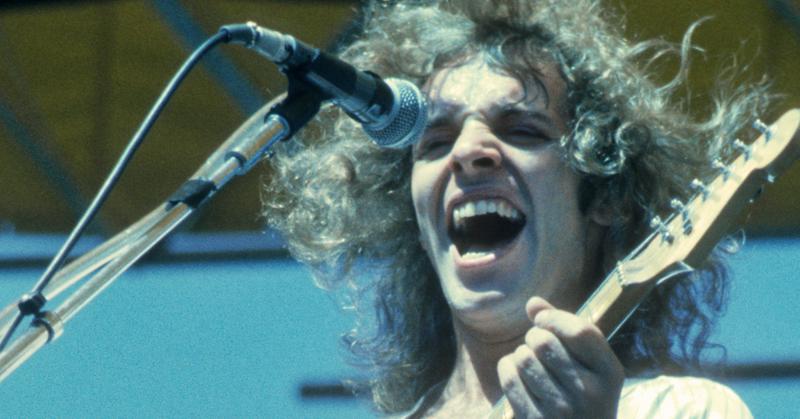1976: 'Frampton Comes Alive' Makes Peter Frampton A One-Album Wonder
By | July 4, 2019

Certain things in life aren’t meant to last: solar eclipses, phone batteries, and Peter Frampton’s musical ascendancy. Similar to a solar eclipse, Peter Frampton’s 1976 album Frampton Comes Alive! flourished brilliantly but only for a fleeting moment in time. Then it was over. The double live LP soared to number one on Billboard’s top 200 album chart and held the top spot for ten weeks.
It also sold more copies than any other album that year, topping out at eight million sold in the United States alone. The album won Rolling Stone’s readers poll for that year and came in at number 41 on the magazine’s Greatest Live Albums of All Time list. However, the album’s mammoth success was never repeated, despite Frampton’s various attempts to recapture the magic of Frampton Comes Alive!.
A Very Slow Build

For the social media generation, going from zero to hero and back again in the blink of an eye, is commonplace. Frampton’s road to summit bears no resemblance to the boom and bust popularity of stars today. Instead, Frampton toiled away as a musician for five years before the meteoric rise and fall came to pass. As Peter says, “I did what you do on social media today by touring for five years.” As the lead guitarist for British supergroup Humble Pie, Frampton became relatively well known in the U.S. and the United Kingdom.
Success But Not A Star

Jerry Moss of A&M records signed Frampton because “He had a cool face, he didn't mind working, and he had a great attitude. ... I thought he was a star.” Moss, one of the heavyweights in the music business, wasn’t completely wrong about Frampton. Frampton Comes Alive! was far from Peter’s first attempt at scaling the mountain to notoriety. As Moss puts it, “Peter had paid his dues. He was with Humble Pie, he put out his own albums. So it wasn’t like this was a new guy.”
"We supported him as a solo artist for four albums," Moss told Rolling Stone. "He was writing some nice songs but was pretty much staying a mid-level artist, selling around 200,000-300,000 records. But Peter was a huge live star in markets like Detroit and San Francisco, so we made a suggestion that he make a live record. What he was doing onstage wasn't like the records – it was outrageously better."
Here Comes The Boom

Frampton Comes Alive! was released in January of 1976 with little fanfare. Nevertheless, Moss held cautiously optimistic expectations. A&M hoped it would go gold by selling a half million copies. The label worried they might never recoup the roughly 1 million they had invested in Frampton to that point. His highest ranking album to date was Frampton (1975), which had peaked at number 23. Frampton Comes Alive! entered the top 200 at number 143. However, in the second week, it jumped to 51 Then through March, it hit No. 22, then No. 6, then No. 4. On April 10, 1976, Frampton got a call from his longtime manager, Dee Anthony. "He said, 'Are you sitting down?'" recalls Frampton, now 65. "'We're No. 1.'"
Herb Alpert, Jerry Moss's partner at A&M, told Rolling Stone:
The sales were abnormal. The day we put out Frampton Comes Alive!, we sold 50,000, and it just kept going. It was his time.
Life In The Fast Lane

Naturally, life changed fast for Frampton and the band. The album sold more than six million copies that year, breaking Carole King’s sales record. Obviously, there were a few moments that let the band know they made it. None demonstrated their rise more poignantly than a backstage moment in Anaheim Stadium. A&M executive Bob Garcia describes the scene best, “All of a sudden, they cleared everybody away for somebody coming to say hello to Peter." It was the Secret Service escorting Jack Ford, son of the President of the United States -- and a Frampton fan. Garcia remembers, "That's when we knew he had arrived.” Reportedly, when Frampton saw 70,000 fans packed into Anaheim stadium, he uttered, "I don't f--ing believe this."
Frampton Comes Alive! is one of the era-defining, chart-dominating albums of the '70s, although the three successful singles released did not go to #1. "Baby, I Love Your Way" hit #12 on the Billboard Hot 100, "Do You Feel Like We Do" made it to #10, and "Show Me The Way" hit #6 -- and all three were moderate hits in the UK as well.
Riding his surge in popularity, Frampton was even cast as the lead in Sgt. Pepper's Lonely Heart's Club Band (1978), a movie extravaganza based on the Beatles album of the same name, alongside another of the era's biggest acts, the Bee Gees.
The Fall From Grace

Frampton’s had risen to mega-fame had been sudden; his fall happened just as fast. Hoping to capitalize on the massive success of Frampton Comes Alive! the band quickly pushed out I’m In You (1977). Despite selling a million copies in a month and hitting number two on the charts, the album was considered a bust. Just like that, the roller coaster ride of presidential visits and sold out stadiums ended. Frampton Comes Alive! will always hold a special place in history -- deserving of its own chapter in the story of '70s rock.
